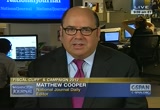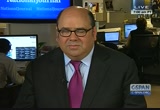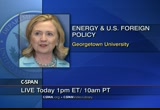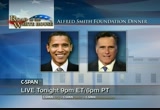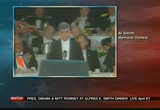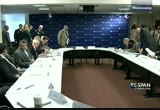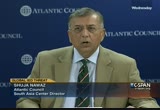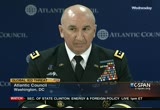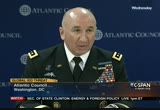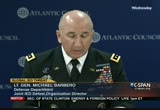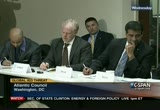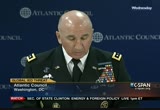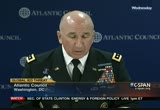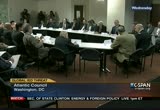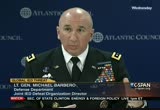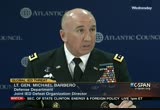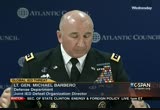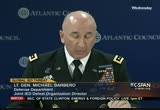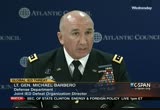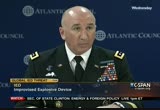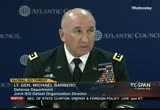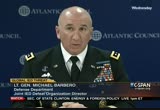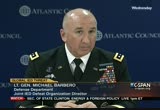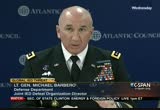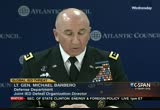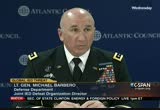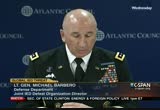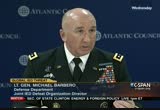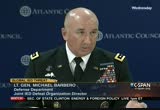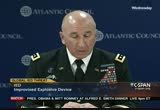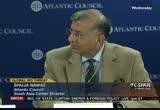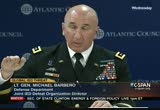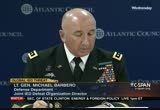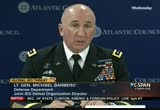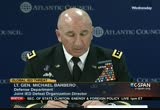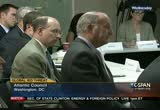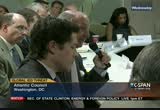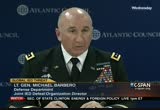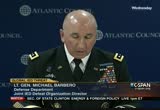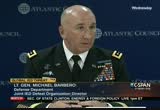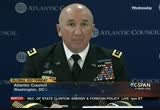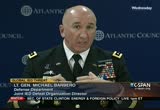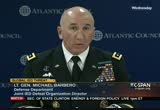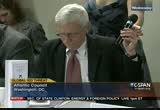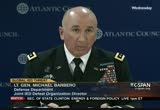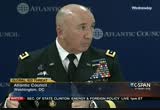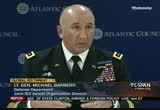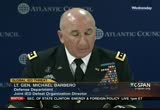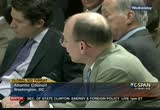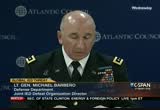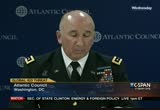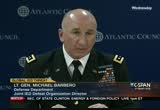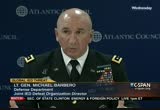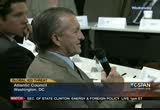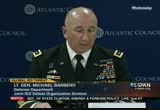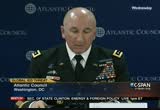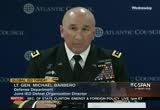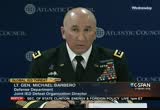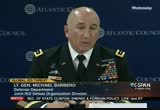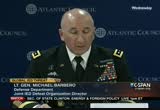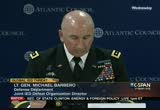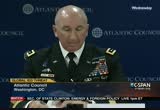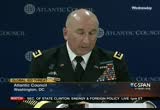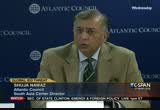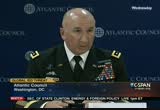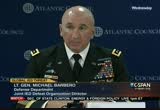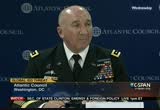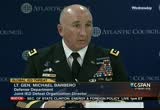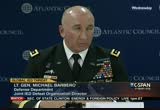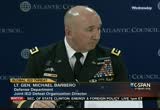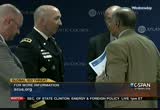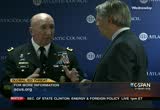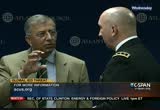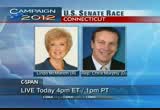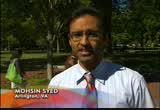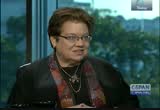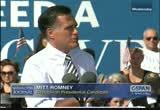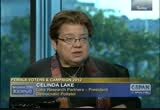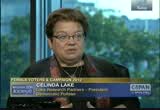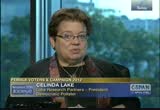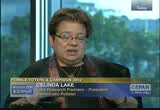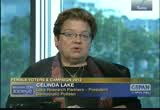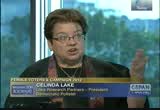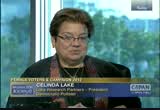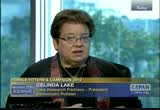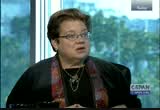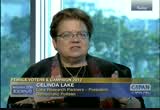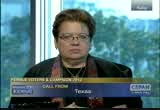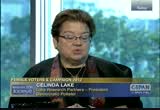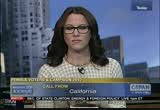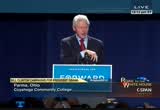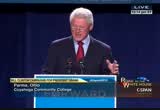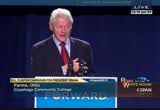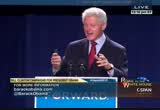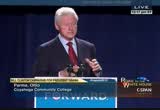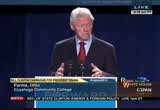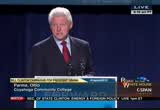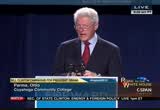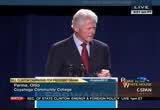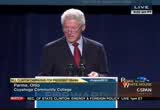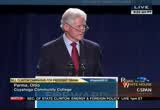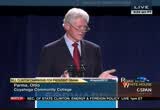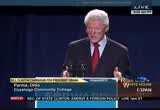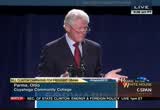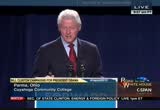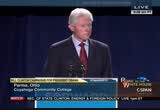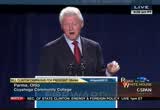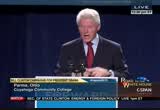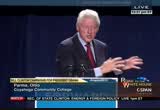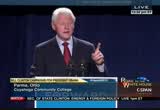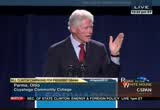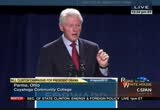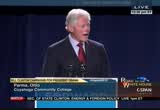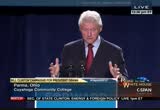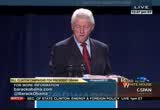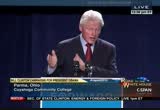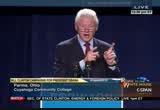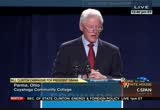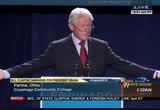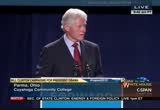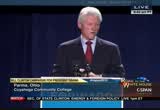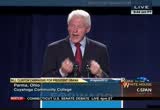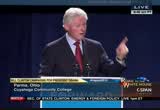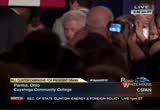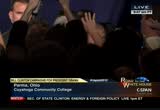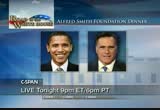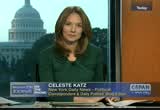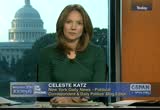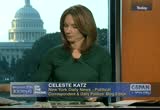tv Public Affairs CSPAN October 18, 2012 10:00am-1:00pm EDT
10:00 am
agree that budget-passing -- we would be in a very different pace. -- in a very different place. you'll never know. the issue is not entirely whether you pass a budget or just keep doing these extensions that we have been doing, but whether you actually change what you spend on. that has been very hard for congress to do. groups wantinterest groups wantp what they have. the public wants what they want. i don't think anyone would disagree about the desire ability of actually getting a budget. as far as green jobs, i think they are different interpretations. there is an interesting new book about the stimulus. it makes the case the amount of fraud was really quite small. in any event, fraud is fraud, and no one likes it. host: all right, thank you, sir,
10:01 am
for your time and letting our viewers know about this new poll. thank you for a good conversation today, for your phone calls, emails. we will be back tomorrow morning 7:00 a.m. eastern time for more. [captioning performed by national captioning institute] [captions copyright national cable satellite corp. 2012] >> lots of live programming. coming up today, at 1:00 p.m. eastern, secretary of state hillary clinton will be speaking about energy diplomacy and u.s. foreign policy.
10:02 am
she is expected to talk about u.s. energy interests, clean energy projects, and securing access to energy resources at 1:00 p.m. eastern. a number of senate debates beginning at 4:00 with the connecticut race. this is the fourth time they are facing off for the seat to replace retiring senator joe lieberman. the debate will be light at 4:00 p.m. here on c-span. as 7:00, former governors tim kane and al and square off in one of the closest races. it will be live from virginia tech at 7:00 p.m. eastern. it is followed by a wisconsin senate debate, the second time that our meeting for the seat of retiring senator. the debate is from university of wisconsin marathon county campus life at 8:00 p.m. eastern. tonight at 9:00, president obama and mitt romney arcing of
10:03 am
speakers at the 67th annual alfred e. smith dinner. it has been a tradition of the dinner to invite presidential candidates in election years to make humorous remarks about themselves and the other candidate. here is a little more about the dinner. >> what is the owl smith dinner and how did it come about? >> it is most famous as a place the presidential candidates show up every four years. they show up, democrats and republicans -- it is really a memorial dinner for smith. it is the thing that if anyone has heard al smith's name, that is probably where you heard about him unless you hang around these hallowed halls. in general, it is probably his most lasting public legacy, the place where his name gets out. it is held every year, not just every four years. you have prominent figures, in.
10:04 am
it is a memorial dinner, a catholic charity dinner. it is a place people get together and try to assess the legacy of al smith and presidential candidates especially trying to crack good jokes. >> most of the times they show up to gather -- show up together. we want to show you some of the past dinners. >> i ask monsignor clark would come up here. it did the president of the u.n. is days or i are without a seat, and i have no intention of standing. >> i must say i've traveled the banquet circuit for many years and never quite understood the logistics of dinners like this, and how the absence of one individual could cost three of us to not have seats. >> as vice president, i am glad to see you here tonight. you said many, many times in this campaign that you want to give america back to the little guy. [laughter]
10:05 am
mr. vice president, i am that man. [laughter] >> as i looked out at all the white ties and tails this evening, i realized i have not seen so many people so well dressed since i went to it, is your party in a portrait of >> we had really good news especially pleased that mr. milosevic has stepped down. it is one less polysyllabic name for me to remember. [laughter] >> you know what this world really needs? it really needs more world meters named al smith. >> it is an honor to s share this dais with the defendant -- descendants of the great al smith. your great grandfather was my favorite kind of governor. the kind who ran for president
10:06 am
and lost. [laughter] >> you can see all of that al smith online. tonight, you can watch at 9:00 here on c-span. with the focus on the presidential debates this month, c-span is asking middle and high school students to send a message to the president as part of this year's c-span documentary competition. students will answer the question -- what is the most important issue the president should consider in 2013? the grand prize is $5,000. there is $50,000 in total prize is available. the competition is open a student's grade 6-12. for complete details and rules, go online to a studentcam.org. >> the director of the defense department's joint ied feet
10:07 am
organization says improvised explosive devices remained a weapon of choice in afghanistan and the devices are an enduring global threat. at any event hosted by the atlantic council in washington, d.c., he spoke yesterday. this is about one hour and 10 minutes. >> good afternoon, everyone. i am shuja nawaz. on behalf of my colleagues and on behalf of our president kim, i want to welcome all of you to this very special session with lt. gen. michael barbero, the director of the joint ied defeat organization as u.s. department of defense. i do not think one can understate the importance of the issue, particularly at this stage in the battle in afghanistan. not only within afghanistan, but
10:08 am
the effects of the war on neighboring countries including pakistan, where the i.e.d.'s are also huge problem. we thought it would be useful to have lt. gen. michael barbero on what the nature of this global threat is and what is being done and can be done to counter it. i will briefly give you a little background and then we will listen to lt. gen. michael barbero and open it up for an exchange with all of you. he was commissioned in the infantry after graduation from the u.s. military academy at west point. in 1976, in addition to every assignment at the tactical level, he has commanded at every grade from lieutenant-colonel to lieutenant-general. as a brigadier general, he commanded one of the combat training centers of the army, the joint readiness training center.
10:09 am
as a major general, he commanded the u.s. army infantry center at fort benning, georgia. prior to joining jieedo, he served over three years in three separate tours in iraq where among his many duties he commanded the multinational security transition, and, iraq and training mission in nato. his a master's degree in national-security and strategic studies from the national defense university washington, d.c.. it is a graduate of the army's command and the school of the advanced military studies program. he has far too many awards for me to list, but you can see it on his chest. i think that should be where i will stop. i am delighted that he agreed to speak with us the floor is yours. >> thank you for that introduction. other than the year i was commissioned, i am reluctant to mention that as i get older.
10:10 am
thank you for the opportunity to see many familiar faces. i appreciate the opportunity to discuss a little bit about this and how a friend by comments, i want to discuss a organization briefly and what we do. how we see the current fight in afghanistan and then how this is truly a global threat and an enduring one. what we're doing about it, then briefly, some thoughts about future capabilities i think need to be retained. first of all, as you know, the joint ied defeat organization or jieedo, was acquitted in 2006, with some fairly unique abilities. -- was created in 2006, with some fairly unique abilities. the war fighter is our customer. we have about 200 individuals for it in afghanistan down to the maneuverable battalion
10:11 am
level. we are well resources. we have some rapid acquisition authorities that allow us to field capabilities with the goal, fielding them in months and not years. the most important word in our mission is rapidly. that is why we exist. if we cannot respond in a rapid manner, we should not exist. we prosecute our mission along three lines of operation, the first is training the force but often not discuss or thought about, but as we found out, the based capability we have as a well trained soldier is -- the best capability is a well trained soldier or. when i arrived in jieedo i would have to to our biggest gap is training. which we worked hard to fix it is that kind of operation is defeating the device. frankly, that carries or
10:12 am
requires a large amount of our funding. we must focus on that because by defeating the device, we afford our commanders freedom of maneuver and limit casualties. however, the third line of operation, attack the network, is the the size of effort. that is where you have, in effect, on the network that supplies and everything that goes into the employment of this weapon. so the current fight in afghanistan, the ied remains the weapon of choice. it is in during as a weapon of choice. in the last two years, i.e.d. events have increased 42%, from about 9300 events in 2009 to about 16,000 events in 2011. 2011 had our highest annual number of ied events ever. june 2012 is a little bit below 2011, the june 2012 was the highest monthly level of ied
10:13 am
events we have seen. overall number of i.e.d.'s has remained high. there are some areas where i think we have seen improvement. two critical areas are look at are found and cleared, are we to in the ability to fight and clear these i.e.d.'s before they are deployed in front of us. that has steadily been proved. in the same 90 days compared to last year the same time, increased 12% for our mounted forces. the second metric i would point to is the obvious one, casualties. casualties are below 57% below last year's rate, despite, as i said, the high number of i.e.d.'s. we focused on limiting effect of attack, those attacks that caused casualties or killing spree many factors have
10:14 am
contributed to what we see as progress in this fight and increased effectiveness of i.e.d.'s. i will list a couple prefers from supplying lessons learned. what are we doing right? what is the enemy doing? what are best practices? and a plan that in our pre deployment training, which i said, has been a focus for it equipment search. in the last year, we fielded an increased number of capabilities, especially focusing on dismounted operations and is very vulnerable dismounted troopers. just a few numbers. we feel that in the last 10 months, 1100 ultralight robots, to attend thousand sets of public protection, more than 8000 hand-held devices and to look the components of the ied, and another 2000 will be filled before the next fighting season. improvements to batteries and external battery packs.
10:15 am
it is a continuous process to field a prepense to existing capabilities. we repositioned eight airborne systems from iraq to afghanistan and delivered an additional four systems, focused on the ied and components that comprise them. there has been in equipment surge. increase in biometrics collection and capability. dna, fingerprint, and other indicators. this is critical. through biometrics, we can remove the greatest defense these networks have, that of anonymity. there has been adjustments to tactics, which is a continuous process. one of will point out is how we approach clearance operations. a tremendous focus on that. also, our commanders tell us the increase in part during operations with the afghan security forces. they're found unclear rates are
10:16 am
much higher because they know what to look for they have engagements with the local population. finally, we have super commanders and troopers on the ground or continuously refining techniques, procedures, and adjusting and tailoring those adjustments to the specific threat. but as i look at the fight in afghanistan, i see two fights back view it. first is a mounted one and one is dismounted. they have different threats and require different capabilities mounted it, there is an individual at the end of a wire when he sees a vehicle, a specific vehicle crossed into the danger and will designate the ied. largely using culverts, where they can pack more explosives for a greater net explosive weight that they try to defeat our vehicle improvements. the attack rate remains down for
10:17 am
mounted. weaponot seen the lethal we saw in iraq, but we are seeing large amounts of explosives with the command wire. i look at that as the enemy's precision guided munitions. what are the critical neighbors? airborne sensors of all types, called first denial systems, pre that nation capabilities, robots and vehicle-born ground penetrating radar. as i look at the dismounted operations, the i.e.d.'s we see are mostly in the south and southwest, largely victim operated, nonmetallic pressure plates, two pieces of wood increasingly carbon rods from batteries that are used in these multiple number from a larger number of i.e.d.'s. we had one incident a couple of weeks ago with over 20 i.e.d.'s and about 100-150 meter radius
10:18 am
as they were moving. multiple i.e.d. a raise. smaller, two to 3 pounds of explosives is devastating to dismounted squad. the found unclear rates continue to improve. critical enablers for these operations are hand-held detectors, protective undergarments, explosive line charges where we can shoot out a line of explosives and that make those along the path of movement, called july 3, robots, dogs are all key in this fight. in talking about afghanistan, it is about home explosives. over 84% of the i.e.d.'s are used combine with common explosives. different than iraq and different from what is seen in other locations. 84% are home explosives. of those, more than 50% or
10:19 am
ammonium nitrate based, direct from fertilizer. this continues to be a problem. in the last 90 days, compared to the previous time last year, our seizures of home explosives have increased 133%. in the last 90 days, we have seized 131 tons of homemade explosives, largely ammonium nitrate. so this is the challenge in afghanistan, detecting and the flow of ammonium nitrate. it is easily processed into an explosive. it is being used increasingly around the world. so that is a brief description of afghanistan. that is our focus. every day. it starts with the discussion of what took place in afghanistan and how we can attack it. it goes without saying, as was said, this is a global threat, not exclusive to afghanistan.
10:20 am
outside of afghanistan every month, there are more than 500 ied events. and since january 2011, there have been more than 10,000 global ied event occurring in over 112 countries, executed by what we judge to be more than 40 regional or transnational threat networks. as of september, the top five countries in ied incidents outside of afghanistan, the first is pakistan. our pakistani partner suffer greatly from these networks and these weapons. columbia, the second. india is third. syria and somalia are in the top five also. it is not just about the devices. it is about the networks. and we see increased collaboration and cooperation between the networks. for example, in africa, with the increased coordination between al qaeda and the islamic group and al-shabab.
10:21 am
in somalia, and the jury as well for the collaboration and training and resources. sharing funds and techniques and to -- materials. nigeria is in a large surge in ied activity. in 2010, they had 52 events for this year, so far, 218. similar growth in somalia. not as drastic as nigeria. syria has seen a tremendous increase in i.e.d. activity. in 2011, we estimate syria had 330 casualties from i.e.d.'s. so far in 2012, 2086 casualties. it has been a tremendous growth. colombia and mexico also. as i look at this, it is an enduring threat that i think both operational and to our forces and domestically will be here for decades. as i said, it is not just about the devices but about the networks.
10:22 am
and we see the ied as a weapon of choice along the threat continuum. at everything from the low end criminal smugglers, narcotics networks, all went to the high end terrorist networks and everything in between. these networks are resilient, adaptive, and very agile. as i tell my friends there centers of excellence are virtual, flat, and unencumbered. they seamlessly communicate sharing recipes, ttp's. i think the way they communicate their command and control system is a huge strategic advantage for them. then we see the proliferation of techniques across these various networks. the projectiles we saw used so effectively, the iranian weapons we saw in iraq, in the
10:23 am
gaza strip, and have seen them start to appear in somalia. the vehicle born i.e.d.'s originated in the middle east. we see in mexico as the drug cartel's target each other. the female suicide bombers but we think originated with the tigers in sri lanka. we have seen across the middle east, southern europe, somalia, and nigeria, russia, and as we see in afghanistan. i like to say that while we in the military in the u.s. march to the sound of the bands, these threat networks march to the size of instability and take the ied with them. we must address the network. it is the critical enabler to attack these. whatever is most cheapest, readily available components. largely an increasingly off the shelf. command wire, pressure plates for it when they can, radio control triggers. off-the-shelf components,
10:24 am
improvised blasting caps that are harder to detect. in the future, when will they migrate is not a question of when they agreed to ultrathin electronics, used wi-fi and bluetooth as triggering devices from optical initiators and how to name its highly energetic materials to create an explosive? and enhanced concealment, as we have seen on aircraft and other places. it is a threat both to networks and devices are here to stay. how do we approach this? i think in the future as we are exercising today, increasingly the whole of government approach. dod cannot do this alone. the phrases, it takes an hour to feed an hour, and that is true. we have partnered and we have 17 federal agencies and services that work with us and have liaison's assigned to us. atf, department of homeland
10:25 am
security, fbi, state, commerce, etc., plus our international partners, the u.k., australia, and canada all have officers working with us. we also have a link with nato intelligence. so in order to execute this whole government process, it starts with intelligence, focused intelligence on these networks where their operating, what are their vulnerabilities. then applying all of the tools that are interagency partners bring to the table. i refer to it as non kinetic targeting. how can we sit tools of state, treasury, and commerce. the me give you some examples of how we have done that and the results of this process. commerce has added 152 persons to the entity list because of ied-related matters. it stops u.s. companies from trading or working with a foreign entity. treasury is imposed economic sanctions on 33 targets that
10:26 am
affect the ied flow into afghanistan. there is a news report in reuters i saw today where they just designated three additional individuals. as of september, dhs global sirte -- global shill program has 40 and act as an 44 seizures. the state has applied a public outreach campaign in various places and also using diplomacy to engage government's that and have an effect on some of their entities. those are just a few examples being applied in this whole of government approach. we have also engaged the fertilizer industry and encouraged them to apply a whole industry approach. i will tell you want to describe the problem to the fertilizer industry, i believe there are very committed to this. both the international fertilizer association, the largest association of ammonium nitrate, they have created a product security board. we have as the industry to
10:27 am
first, implement a universal by program so these materials can be easily present nine by border police the last recognized by border police, border authorities. they look something easier to identify than they are today, which is a milky white, to be disguised and often repackaged as detergent or other materials. the second, develop a non- damnable alternative to calcium nitrate in its current form. right now it is too easy. as an industry, they need to take this on. third, institute affected industrywide standards on the distribution and tracking of their products. finally, fourth, produce a global education and awareness program on what to look for for the misuse and misappropriation of these products. we understand there is a huge challenge. given the ubiquity of these products, they're essential nature to the global agriculture, however we feel,
10:28 am
this must be addressed using every tool possible. as with the to the future, what do we think? i know if i get asked about the future of our organization, i will talk about it. but in my view come in during threat requires injuring capabilities. whenever we have come out of any conflict, we have taken a hard look at what worked, what we need to retain as far as to the ability and what are the threats we need to prepare for for the future. i believe we need to retain his rapid acquisition and fielding capability. we cannot go back to the acquisition and fielding capabilities that we had on september 10. how do we do this? how do we share this with our allies? we must retain this operational intelligence and information fusion and analysis so we can provide our commanders in real- time through reach back intelligence they need to immediately have situational awareness and to conduct operations against these networks. training. we must institutionalize the ied
10:29 am
and the networks that employ them as a key threat and factory in our training. the whole of government approach. there's a tremendous sense of urgency in our government because of the casualties and a fax to our troopers and nato troops in afghanistan. we must maintain this capability because the networks will endure. next-to-last, i think weapons, technical intelligence. as i said, this removes the anonymity from these networks. everything from biometrics, dna, fingerprint, how can we retain these and not break them apart? it is a powerful game changer. how can we retain that as a skill. for the military, how can we continue to convert intelligence into evidence, to enable our agency partners to apply the tools they have. the final skill i think we need to have is what i call financial intelligence. the life blood of these
10:30 am
networks is there funding. where is it? what institutions are cooperating? where is that nexus between licit commerce and activities and illicit activities? where are the vulnerabilities and their funding and have to me go after them? in my view, we have built this capability. everyone in the u.s. interagency, everyone does a little and no one does enough. how can we build this capability and retain it into the future? just some parting thoughts. just as the artillery was the greatest casualty producer in the 20th century, the i.e.d. i believe is the artillery of the 21st century. there is no silver bullet to stop these casualty producing devices on the battlefield or here at home. and these networks and devices i believe are injuring global threat both wherever we go operational in the future and here at home.
10:31 am
they must be met with a coherent and focused approach into the future as we deal with these. with that, thank you for the opportunity and i look forward to your questions. >> thank you, general. if i may, i will lodge with a couple of short questions and hope our colleagues will then join in the conversation with you. i very first question relates to the transition in afghanistan. you mentioned the training of partners. clearly, a big challenge which will remain is the ied, once the in the states and the coalition departs. to what extent is their capacity? do you have enough time to convert that capacity into a fighting force that will be able to counter the ied once the coalition ceases fanatic
10:32 am
operations? >> we're in the process of to transitions. one is from a leading combat to an advisory role, and different formations with differing capabilities, u.s. for missions are deploying to answer that. the largest challenge is a transition to afghan security forces. first on u.s. forces, through 2014, we are focused on supporting this force. as we saw in iraq when the number of your troops reduces and you're no longer in the lead and as active as you are, your situational awareness becomes less. how do compensate? there are a number of capabilities. additional counter id capabilities, isr. as our boots on the ground, the number of troops goes down, does not mean all of our capabilities will reduce proportionally.
10:33 am
many will stay the same, some will need to increase. the afghan security forces, because of my funding, i cannot directly fund their capabilities. but we are engaged, dr. carter, secretary of defense, has taken it as a party to look at how we can support the building. as you talk to brigade commanders as i did in july and will do next week when i go, they tell you when the department operations, the afghan forces are very effective. they don't need the same abilities we do. they need capabilities they can sustain and capabilities that are suited to their skills. so that is what the isaf has looked at and in the process of building. counter id, route clearance and
10:34 am
other capabilities are being dealt appropriately. as i said, when they are out front are partnering with us, they are very effective in this effort. >> my next question is about the relatively smaller part of pakistan. i know this has been the source of some debate and discussion, particularly with the pakistani partners on how best to prevent the flow of fertilizer that is used to create these weapons. pakistan is not the sole source of this fertilizer, i understand, but to what extent is that discussion yielding fruit? what you use the right term there, they are our partners. as i said in my remarks, pakistan has suffered greatly. their security forces, civilians to these networks and these devices. as i said, outside of afghanistan, they have the no. 1 in monthly incidents.
10:35 am
so we have had discussions. we have had several exchanges. we have had two reset pakistani military visit here to our headquarters and similar training facilities. i've been there twice to meet with our pakistani partners to talk about this. every leader from secretary clinton and general allen and our ambassadors in pakistan have made this a topic of discussion. in our view, this is a mutual threats that should elicit a neutral response, and is an area that is obvious for cooperation. as i have engaged i iraqi -- i'm sorry, pakistani partners, i have said, we are here to assist. let us know where we can help. we have capabilities we can share with you, however, we must do something about these networks and this flow of materials into afghanistan.
10:36 am
so what can be done? in my view, pakistan has taken the step and developed a national strategy, the minister of interior has responsibility for that. however, i believe in needs to be resourceful and there needs to be an action plan on how to implement it. we must improve interdiction. i have given you the figures of what we have interdicted in afghanistan. there must be a partnership in that also. then we must cooperate to go after the money and these networks in operating in pakistan that threaten both the pakistani military and the nato forces. we are ready to cooperate with this effort. we are partners. this is an area where we both agree. we need to move from discussing cooperation to active
10:37 am
cooperation. >> thank you. i would like to open it up. could i request when the microphone comes to you, identify yourself, please. also, if you wish to ask a question, if you could sit by me by putting your name card on its side. then i know who to go to next. >> good to see you. three questions related to your comments about the future. post 2013, -- 2014, when we're out of afghanistan, could you expand on the future of jieedo and the context of austerity? you can make the argument what we spend to what they spend, it ain't in our favor. second, you did not touch on the issue of si based i.e.d.'s that may be more of a naval issue, but i'm not sure. perhaps most interesting, what about airborne i.e.d.'s and drones with the other side gets
10:38 am
them >> rick hezbollah has been flying drones over israel. some character was arrested in virginia for trendy use one. but certainly the bad guys would get these things and will be flying i.e.d.'s. i wonder what your thoughts are as to how you or someone else is addressing these? >> for the first one, the future but organization, that is the wrong question. the question is, the ied and the networks that employ them, are they here to stay? and they are. if we have an enduring threat, do we require capabilities that endure? yes. dr. carter has taken on the effort of looking at not only jieedo, these other task forces that were created throughout the years in the department of defense to address an exigent need or urgent requirement. what endures, how to reshape that, and how we resource that. he has taken that on. over the next few months, he has
10:39 am
said we will work through this. but he has told us clearly, our mission, our resources, our support remains unchanged. that is our focus. more to follow on the future. my view is, there are certain problems and challenges that are best served with a joint response, and this is one of them. services do great work. but when you're talking about different program managers, the navy has the lead for counter radio controlled i.e.d.'s, for jamming, the air force brings other skills to this, the army and marine brig this requires a joint response that is capt. not just for this, but for all combat and commanders, for intelligence and analysis and other capabilities. that will grow in the future. it does look at africa, the organizations i mentioned.
10:40 am
it must be joined, must be tied in with a global perspective. , we are i.e.d.'s involved with the navy. there are three specific initiatives we are funding through the navy from sensors to the ability to look for counter swimmer and some other capabilities. as to go to the future, we need to look to how the wide range of what is possible and start developing counter capabilities whether it is seaborne or, as you mentioned, in the air. you mentioned the cost exchange ratio. their business model is crushing hours. i talked to my industry partners and said, the days as of spending hundreds of millions of dollars on this are over. we have to be more effective and more efficient. whatever we develop has to be
10:41 am
expeditionary and has to apply in other regions other than afghanistan. when you can buy a bag of fertilizer for about $100 and out of that with a little propane, water, and a tarp to try it out, some plastic jugs, a few blasting caps and detonation cord chris 6 to a devastating i.e.d.'s, we cannot sustain that. we have to do two things. we have to figure out a way to build capabilities more efficiently and effectively on our and to drive down our costs the drive up theirs. of physical cost, finances right now, how to go after their money, how to seize blog assets and make it more costly in a wide range of ways for them to do business. that is what i see we must do in the future. until 2014, we are here. we are well resources and focus on the fight in afghanistan. >> thank you. >> will you wait for the
10:42 am
microphone critics captain mccormick from cbs. i have some statistics. did you say june was the highest month we have seen? >> june 2012 was the highest number of ied events. that is one that is detonated, one that we find and clear a cache of i.e.d.'s, every ied we encounter. the number of those was at an all-time high in june. >> and the space of time that has passed, what have you learned about why? were there more operators? were there more locations in which they were planted? was there a baseline there that had changed? >> i think it goes back -- 2011 was the highest of war. an article said, these high number of ied events can be interpreted as failure. i don't look at it that way. but a larger number of troops
10:43 am
taking a flight into some areas that were described as safe havens. these are weapons they're going to employ, so you have a higher number of events when your active. in the last few months, there have been operations that set the transition to the afghans. so they have been very active in certain areas. it is hard to explain, but it gets back to a supply problem. when we are sweeping historic amounts of this fertilizer and other materials off the battlefield and the number of i.e.d.'s remains high, we have to do something different other than playing defense in afghanistan. >> secondly, on the number of explosives seized, the ammonium nitrate, were there certain areas where you found more of that and where was it coming from? >> we see ammonium nitrate everywhere, calcium ammonium nitrate, the fertilizer, and bags, largely, also after it has
10:44 am
been processed into ammonium nitrate, which is more explosive form at it. we also see potassium chlorate, which is another product used in industry to make matches and other things. we have seen a slight increase in that. potassium chlorate, we shall see associated with the the canny -- haqanni network those are the two prime components of the explosive charges. most of it has come through pakistan. >> we have a question. >> general, i would like to delve a little further into the seaborne, which is relatively new for your organization. could you go little more in depth into what these programs are and are you involved in the research are just finding? how is it going?
10:45 am
>> we are involved. it is the navy -- we need to get more involved as we move to the future. i can give you some specifics on the three initiatives. one is a sensor for remotely operated vehicle to detect waterborne i.e.d.'s. as i said, it is a remotely operated vehicle with sensors, command and control software, and a manipulator to invest ap's for inspections around peers, pilings, sea floor, etc. the second one is and mobile killing, which helps us map using underwater mapping sonar -- moblie queing, which helps us map underwater mapping sonar. there are a number of other initiatives that deal with other waterborne threats, swarm, and other things like that which i probably should not talk about. i see this as an area where we
10:46 am
need to become more engaged in a vault with the navy. -- more involved with the navy. >> [unintelligible] >> i do not have the exact figures but i could probably get back to you. >> thank you. >> when he met the pakistani interior minister earlier the last month, was anything specific that pakistan had asked for in terms of countering i.e.d.'s, as you mentioned, the u.s. is willing to cooperate, so what specific the equipment, training, can you is provide pakistan to help them with their international ied strategy? what's the minister of interior was here for discussions at the state department i think counter-terrorism and other threats. i think it was just two weeks ago and there is a press release put out by the state department. i have seen others. it was a wide-ranging discussion about what we can do to cooperate in this area. as i met with the pakistani
10:47 am
military, we have agreed to develop a framework of cooperation but where can we cooperate? i believe we can contribute with training. we can contribute with some equipment. i know there has been some equipment transferred and there have been some general discussions of requirements in some areas where they could request some assistance. one is forensics and hand-held devices and the like to help better detect these instruments. so we're in the discussion. we look forward to better specifics on what we can do to help, and also the next step in these discussions. >> thank you. >> roger kirk. of the presence to carry regulations at airports, the dhs has put in, are they adequate to
10:48 am
detect current i.e.d.'s and is that an increasing threat that they use different kinds of ways to make i.e.d.'s? >> i cannot comment really on the adequacy of them, but i will tell you for every new invention we have for every new communication system, there is someone else in the world looking on how to use that whether it is wi-fi as a triggering device, how she's broadband effectively, how can we develop nonmetallic and undetectable components to be able to use in aircraft in times square and other places? so they are actively working to bring this threat to the homeland and we have seen in print times square and other examples come under were bombers on airplanes.
10:49 am
and continuance for product improvement with every step along the way. it is of concern and something we are dealing with and will have to deal with for the future. >> i am the navy fellow here the council. i was wondering if you could comment on the speed with which these actors evolve? >> in afghanistan, we used to be engaged in arms race that took years to produce a new radar or new icbm. now it is weeks and months and not years. they adapt in several ways if they can tell -- they watch and see if we're successful in detecting in seizing certain things, they'll change the way the process it. they watch as tactically. if they watch where we dismount
10:50 am
and our vehicles, then that is where you'll see the i.e.d.'s. they know for a fact if they can engage us with small arms and inflict casualties, we bring in helicopters. where is a likely landing zone? when we make contact with our dismounted troops, the first and we do is look for place to put our machine guns. that is where the i.e.d.'s are. it is as we adjust, the rhythm of combat, we must always stay agile. we must remain more agile than them rid our commanders and troops on the ground, it is a continuous learning process that we try to bring back to the training base. the first time a trooper seize a piece of equipment or lines have to use it is not in afghanistan when he arrives at his operating base, or at his home station that a big turning event than in
10:51 am
afghanistan. so they are watching our tactics and adjusting. there also, as i said, the materials, how they employ them, how to construct these devices is constantly evolving both in afghanistan and globally. it is seamless, how they're sharing these. you can go on into that now and learn how to process the calcium, nitrate, the projectiles as i have said that have migrated, so it is a continuous process. they are learning, adaptive. >> thank you pretty steve. >> thank you. my question is, how is industry performing for your mission? in particular, i am interested to know how they're performing with respect to the speed, responsiveness, the expeditionary nature of the mission and if you can go so far
10:52 am
as to say lessons learned for industry and how to be effective mission like this, that would interest me. >> early on, it was apparent to me from the back we were a little too opaque with our requirements to industry. we developed an unclassified, here is our gaps in our capabilities. it is on our website. if you bring us this, where the venture capitalists, we're here to invest in it, get it to a point where it is good enough and get it fielded. so they have been very responsive. i have yet to find an industry partner who says, i'm not interested in helping out with the number one killer of our troops. they're all motivated. some things we will not get out there fast. if it is a nuisance to the committee created over time, you
10:53 am
can throw as much money as you want and it is not rapidly fielded. a lot of them, they have been very responsive and very attuned to the requirement to rapidly, as something that is good enough. for example, last year in talking to a group of marines down at cap mansion the-fashion, there had been -- i said, i heard you need robots, something that can pre detonate these things but they said, we want something like we can throw about 100 meters. less than 5 pounds. it's blown up, we have another one in our backpack. so we came back, it issued a broad area announcement. we got 40 proposals. we narrowed it down to 63 by then had received the official
10:54 am
request from -- we narrowed it down to six. by then we have received the official request. we did some testing in the states to where we thought it was good enough, then we said use these with your dismounts and are ground clearance and tell us which ones you want or tell us how to improve them. i think there will come back and say, we want either to or all three types of this in certain numbers. then we have already set the conditions with these three producers. we're ready to write the check and get them as fast as we can. that is kind of how we operate. very responsive, very interested and very engaged with us, to answer your question. >> the meeting you had with the squad, when you're able to give them time? >> this is not ideal, but it was shrinking robotics and there was a challenge in getting a day/night camera in there. it was about eight to 10 months
10:55 am
before we got them over there. that is not what we strive for. another example, when we looked last year at the injuries that our dismounted troops were taking. we called our british partners and said, what have you got? they came over and laid out the hand-held devices. we were already investing in one of them, and doubled down on that. they also brought over protective undergarments for it was said, what is it? we sent a couple of across and within a few months, we had fielded 210,000 kits. they have been effective in limiting the damage, the injuries to our troopers when they do get hit by these i.e.d.'s in the dismounted node. we're looking at how to improve those, make them lighter, more comfortable. that was done in four months. that is the target on how we can do things faster, how to get them before the fighting season. i mean, if we can get them a
10:56 am
certain amount of funds, that is great. if it is ended june or july, we have missed the fighting season. we're looking at accelerating capabilities before the next fighting season. >> i recently attended a night class briefing for organization put on. i was real impressed with the way you put out the contract bids for people to come back with a different type of equipment, the size, the range, etc. also, the way your during the acquisition has to be praised because the reaction needs to be spun. if anyone wanted to know more about it, it was unclassified. that was a great briefing. until they got into the nano matter.
10:57 am
i just wanted to sing your praises of jieedo and what they're doing. >> it goes back to what i said about unique authorities. i can sign off on it and we can get on with it. we realize last year our first time troopers resting hand-held devices and afghanistan. that was the right thing to do, to get them to theaters as fast as we can prove they're saying, sir, i am a little busy first week here in the country. so for $24 million we said, let's buy 70 sets, put it at their home stations, let them trade at their camps and put them at these big training center so they hopefully see them twice before they occupy their battle space. anything above $25 million we have a rapid staffing for all of these services to dr. carver, and i think 10 to 18 days.
10:58 am
if not, then, we start making phone calls. >> [inaudible] >> industry, the national labs, this is about building a partnership and who else we can partner with and use their unique skills in this fight. that is an area i said we must retain. we cannot go back to focusing on programs of record, five-year plans. on the other part of the world, there is some guy sitting there not constrained like that. he is as agile as he can be. >> thank you. >> thank you. >> i have two questions, if i may. if you could clarify, what would be the single biggest contributor to the delay in getting whatever it is to the field? is the geography? is it industry? >> it is not funding our
10:59 am
bureaucracy. some of these sensors we are fielding detect a very small component from 10,000 feet to 40,000 feet is just plain hard physics. the sensors either do not exist and it takes time to develop tests and get them to good enough. or it is day one of that takes a very long time to develop. there is one -- i want you what it does, if it was very useful and iraq. we shifted them to afghanistan. they are our best detection platform for this one type of ied. we just got a request for two more. the first response was, well, it will take x number of months. is it going to cost us more? how much? it is not the bureaucracy or funding. at great funding authorities and responsive staffing within the department of defense for anything above $25 million.
11:00 am
every time we have staff one of those initiatives, it has never been denied or held up. some of these are very hard to put together. >> [unintelligible] all of these factors coming together. kind of -- how to adapt jieedo to make somebody on the hill or elsewhere say, ok, you are -- >> we have great support on the hill, and anything more than $2
11:01 am
million, which breeze that bill. that is important. our budget last year was $2.4 billion. this year -- for next year, we have requested $1.9 billion. we have taken a serious look at our budgeting. easy thing is to say we need to push for it again. we have different requirements this year, but certain things are done at known -- are unknown. there is going to be another fighting season. we have two transitions we have to get through, the transition to an advisory role and the transition to asf. and then what we do not know, how will the nsf developed a
11:02 am
capabilities? we think our request for next year is appropriate and anything but that i say we would be accepting a significant risk to my mission. >> thank you. >> hi. i am from the woodrow wilson center. [indiscernbile] i am the pakistan scholar for this year. three short questions. the first one, you spoke about fertilizer 3 industry, which is supplying -- which is where most of the fertilizer produced that ends up in ied's./ could you shed more light about that, why there has been little progress on that? you also talked about potassium fluoride, and that is where there was a question of where
11:03 am
the incidents had evidence. when you talk about the high numbers on june to doesn't 12 ied, can you give as a profile of the highest number compared to the south and central afghanistan. you also talked about in a knowledge transfer, there was an impression that ied's in afghanistan in the theater were followed by the spike up ied's in iraq, and that is where that kind of knowledge transfer. do you agree with that, the parallel development in afghanistan theater? >> the last part of the question is, has there been a large transfer of knowledge from iraq? >> the first 10 that ied's started in afghanistan, and there was a question why we have not seen an increase in ied knowledge and technology and use
11:04 am
in afghanistan, and people said it was because of iraq. >> first of all, as far as potassium chlorate and where we see at the number of ied's, in the southwest last year that is where the marines were moving, highest is thate number of marines and casualties. rc south and east is where we see the majority of ied's. as far as transfer of trent techniques and tactics from afghanistan, in afghanistan the testing ground for the world? we're seeing developments in different areas. i mentioned the explosively for projectile which we have seen in iraq, somalia, and we have seen
11:05 am
one incident in afghanistan. improviseding in blasting caps. i cannot draw a line from what we saw and experienced in iraq as far as tactics, techniques, and procedures trade iraq was largely military munitions at the outset because that was most readily available, and then be explosively formed project will begin the weapon. in afghanistan is homemade explosive, improvised pressure plates. i cannot draw that thread between the to the elements in afghanistan and iraq. the materials you picked were too cheap and they use what ever is most readily available and
11:06 am
works best, and that will change. the first question was about fertilizer. >> i cannot answer that. it is a common threat. we must -- the fertilizer industry has taken this on and they are moving out to take a look at this, and take some actions to institute some of these four changes that have been adopted. as far as progress, there has been some activity in pakistan. they have changed the bags and put a number up -- but not different numbers on the backs gs of fertilizer. we have not seen the effects yet. >> thank you. i am the marine corps fellow here at the council. you mentioned the network at attacking the network, and i
11:07 am
understand the network is a lot of things, equipment, people. it is information, but you also polluted that might be the center of gravity, the death blow, and to me you also commented on the fact that information sharing on tactics, techniques, procedures is fairly easy. so in order to attack the center of gravity, it has to be a definable thing. can you comment on our ability to attack their use of the internet -- hesitate to use the word cyber -- but to me there is a lot of hungry people out there who are willing to go on the offensive on the cyber peace, and this is a logically approacha to get inside something of what is happening. >> it is a huge challenge.
11:08 am
we do very little in that area. i am probably not the right person to talk to. we need to take it on. that is their c4sr. how do we neutralize that advantage, a strategic advantage we have to take it on in the future. i cannot answer what is being done in that area, though. >> if i could go back to my first comment, which is the issue in the end it is not just technology, because you are doing your best trying to deal with what are the symptoms of an underlying disorder within the society's that we're operating in. there is and missing nexus in my view. once the transition is over, the
11:09 am
challenge will be for local governments particularly in the region we have focused on today in afghanistan and pakistan, to change the underlying conditions. there is also particularly in pakistan, once the coalition departs, there will not be a reason for this friday. i'm not sure the evidence is in on that, and i am wondering whether there has been any debate or discussion, adequate debate and discussion, within the countries concern. feel free to not answer that. i just wonder how those in the group wanted to provide their views. >> i am not sure what the discussions are.
11:10 am
attacking the network is the most difficult challenge you have, understanding them and detecting vulnerabilities. it is credible, but it is the most difficult, but i am not sure what those discussions are in most other places. >> the second question. >> general, you did not mention dogs. apparently we are using dogs with the ammonium-based weapons. you need something to detect that is. talk about what we are doing with dogs, are there other chemical sensors you are working on sits there so little metal involved in this ied's. >> dogs are critical. we have commanders that's where by then. we -- we have commanders that
11:11 am
swear by them. they are very effective. interestingly, the key variable in the performance of dogs is the selection of the handler. inyou're not successful finding a handler, you will not be successful. selection of handler -- and we are involved in keeping the dog urrent, and there for idea of censers of these homemade explosives, especially ammonium nitrate weapons. >> another question? >> i have been on this advisory
11:12 am
board forever, but is there a nato set of excellence for ied's? how are you interfacing their and how much progress had you made with act and capacity, too? >> i left iraq, my commander asked if i could work with nato, and we work closely with the allied command transfer in or d.rfol they have written and published a nato counter ied strategy which is fielded in both -- it is a good strategy. ere is a center of excellence in madrid, and yet
11:13 am
we have work with them in training. as recently in brussels, met with a nato commander, and determine how we can better partner with nato. and then finally the nato intel facility. we have established a presence so we can have direct linkage in exchange of intelligence. as we come out of this 10-year we cannot let budget pressures affect this. there are three smart defenses that nato has planned to look at specific capabilities. there are three counter ied capabilities. we have proposed a fourth one, which is moving its way through the system. i am confident that will be
11:14 am
adopted. i feel good about where nato is going, and we are tied into them. >> we have you back here three years from now, what would you like to say at that time about where things are, particularly at the end of the transition? >> two things. first we were effective in limiting casualties in afghanistan. that is our focus. i talked about progress earlier. to some kid in bethesda and some family in kansas, that is not progress, so we have to do better. i would like to tell you we have limited casualties greater. and then after we look beyond 2014, we have institutionalized the capabilities to allow us to meet this enduring threat.
11:15 am
we will work hard as hell on the first one, and i am confident that we will be able to report out success in the second one. >> thank you very much, general. we appreciate you taking this time. if there are no other questions, i want to thank you on behalf of my colleagues. >> thank you very much. [captions copyright national cable satellite corp. 2012] [captioning performed by national captioning institute]
11:18 am
>> hillary clinton will speak about energy diplomacy at an event hosted by georgetown university and the state department. she is expected to talk about u.s. energy interests in securing access to energy resources, coming up live at 1:00 p.m. eastern on c-span. president obama and mitt romney ome time off. they are both keynote speakers
11:19 am
at the alfred smith dinner this evening. that is coming up live at 9:00. >> i have made mistakes in my personal finances. i made those mistakes and i fixed the them. everybody that has looked into the allegations have said they are completely false. every independent financial expert. what makes a lot of these attack ads we have seen from linda mcmahon especially troubling is the fact that during the exact same time, she still had not paid back the $1 million that she owed her creditors from a bankruptcy 36 years ago. >> we need to talk about the issues in the state, and an occasional, financial slipped is
11:20 am
not what we're talking about. you absolutely need to be honest with the people of connecticut. you need to be honest about the special interest loans. you need to be honest about your attendance in washington. those are issues that are important to voters because they want to know can they trust the congressman that they -- that they the scen are sending to the senate. >> this month and leading up to election day, followed the key house, senate, and governor's races. >> you will get a chance to see these candidates this afternoon at 4:00. coming up live at 4:00 p.m.
11:21 am
eastern on c-span. at 7:00, tim kaine and george allen square off again in one of the closest races in the country. that will be followed by the wisconsin senate debate between , thompson and tammy baldwin. it is the second time they are meeting. herb kohl is retiring this seat. >> i watch two different types of programs on c-span. i've watched your convention, when you show your old conventions and debates. i have a memory of being 80 years old and watching an old nixon speech from the 1952 convention. the fact that you focus on a wide range of policy issues,
11:22 am
there's something for everybody, whether you are interested in national security, something with the economy. i like that you cover talks where that is covered. >> mohsin syed watches c-span on comcast. now a discussion on how both presidential campaigns are focusing on female voters, from this morning's "washington journal." host: let's talk about the female vote. votes decides elections, in part because they tend to be more volatile to the end. even though women hate-
11:23 am
advertising, they respond to it more, and women have swung back and forth. in 2008 they gave obama a huge margin. in 2010, for the first time, when it voted republican for the first time in 47 years. now they are strongly favoring romney. they change their minds cuquitea bit. host: how would you describe the last caller? guest: the swing vote tends to be an independent, swink of voter. very hard hit in this economy. on the one hand it is worried that the president does not have enough concrete plans for the future. they think mitt romney does not
11:24 am
get her. she is not in her binder, so to speak, and really torn and looking for the candidate who can say what are they going to do next year to help their family. host: characterize the voters. guest: the women's vote is not monolithic. there is the gender gap, but bigger is the marital gaps mariott voters tend to vote republican. they do not always show up to vote. the other question for democrats, and it was interesting that she said they might not even vote. the problem is to make sure they're voters turned out to vote. host: is that something you are seeing? guest: democrat the voters always tend to be less
11:25 am
energetic, and we rely on younger voters, people of color, and married, who always tend to have low work turned out. i think it is a commendation of the vice president debate and the president's performance yesterday really helped that, and you will see strong tv operations, but as you were pointing out in one of the articles career, the republicans have a formidable get out the vote operation. this will be a real war on the ground in terms of who gets their voters and out. first there are women of color, and they tend to vote democratic. and among groups like latinos, are voting more democratic than the males. then there are younger women,
11:26 am
and seniors. seniors are voting republicans, and obama has had a problem with seniors for some time. younger people if they vote, voting very democratic, but a big question about what the youth turnout is going to be. host: obama may not get a big backing again because only 48 percent of voters ages 18 to 24 say they will but. guest: if you look at 2010 come off-year elections, 6.6 young women who voted in 2008 did not show up in 2010. 11 million and married women who voted in 2008 did not vote in 2010. host: let me ask you their top issue. the polls that we had this morning in the papers show most
11:27 am
important issues that impact women, and when they ask women that abortion topped the list. guest: i was flabbergasted, but it is a combination of women's issues and abortion and the economy. the new polls that are out showed that 41% of women, that their top issue is a woman's issue, abortion, birth control, and that is surprising. that is record high. there are two aspects. a lot of women voters feel like i cannot tell the parents guys.en these dyes tommy yes or no, are you for a or no, -- tell me yes are you for a woman's right to choose? all the activity at the state level really heightened these issues. women are concerned about the economy, and the number one question we get in our records
11:28 am
from women voters is what are you going to do next year to make my family situation better? host: those are the two top issues, not new to both the campaigns. let me show you what romney had to say yesterday. [video clip] >> catherine spoke about women and their quality end the work force for it why is it there are 3.6 million women in poverty today than when the president took office? this president has felt american women. they have suffered in terms of falling into poverty. this is a presidency that has not helped american women, and as i ask women what can i get help, what they speak about is helping me find a good job or a good job for my spouse and help my kid -- make sure my children
11:29 am
have a bright future -- better schools and better job opportunities. that is what the women of america are concerned about, and the answers are coming from us and not barack obama. guest: full a message accept in the end. time when it heard that they had a five. plan they thought fantastic, but when they did not have the details, they were flat. and after the last debate, they said, what is this plan? there are a lot of his policies that cannot serve with it very well. he will not enforce tough equal pay law, and he will not raise the women and thus raise the
11:30 am
minimum wage. we give tax breaks to jobs going overseas, and he supports free trade. it wouldn't support fair trade. when you analyze his policies, mitt romney's policies fail women, too. host: how did the balco? guest: both candidates have a lot to answer for. but candidates are beinleaving n feeling what are you going to do? if i had any advice, you need to be specific at this point. romney is saying he is the senate, but he does not come up and went see through in it. host: in 2008 women made up 52% of the vote, guest: and may be even higher this year. it could be up to 54%, but you
11:31 am
will have the same thing. women are registered and higher rates, it turned out in higher rates, and there are more of us. it is up to the women. they will determine the presidency. host: ginger is up first on the republican line. caller: yes. they're so many people in our family that were never even registered to vote. i was registered to vote when i was 18. that was a thing from my family. my family -- we are from north carolina, live in mississippi now, grew up in nevada, but that was a privilege. it is a privilege to be able to vote and have a voice. semitic people in mississippi did not know that pit -- so many people in mississippi did not know that.
11:32 am
now it is really important that we all have a low voice. host: who are you going to vote for? caller: mitt romney, because i feel like he has a plan -- i am not sure what his plan is, but he wants to help the economy grow. my husband and i have our own private business -- had our own private business before katrina, and we really struggled, and it is after katrina, we folded the business. now we have no income. host: a businesswoman, is it you are attracted to romney because of his business background? caller: no, because he is a family person, he has good values, he has good family values, he is kind, he is generous.
11:33 am
what he says and nobody has disputed income of what he did for massachusetts. host: will leave this and get some more voices. guest: thank you, and the most important thing you said that i agree with you, i remember the first day i got eligible to vote. i register to vote, but a lot of people were not raised like you and i were. i agree with you. election day is the one day be what are all equal, man or woman, rich or poor, young or old, and it is important that people vote. it is also important that they get counted, and that is one of the things i find most disturbing, the renewed efforts to discourage people from voting, and i think that is really wrong in america. the other thing you said that i thought was interesting is you hoped that romney would get the economy going. he had a plan, but that plan was they, and that is a problem.
11:34 am
which meant voters feel that either one of these -- when voters feel that neither one of these guys is being very specific. i want to know exactly what you will do for my family. what is interesting, and you know mitt romney a lot better than a lot of women do, because a lot of women do not trust him, but most have included both are strong family man, their best the honest, they're both in solid marriages with good wives, care a lot about their kids, and it is nice for women. host: we will go to joyce in north carolina, democratic line. caller: hello, c-span. how are you? host: are great. what is your question? caller: of my questions is who
11:35 am
gave the go ahead for pakistan build on the land that we took in cassette in the peace treaty -- in gaza in the peace treaty? it does not matter who is president. until the land is given back to israel, it is not going to get any better, and neither is it the united states. host: a foreign policy issue, the topic of the third debate. guest: you asked a good question, and i do not know the answer to that. women are more worried about foreign policy than they have been in the past, and they are worried in a lot of the ways your caller as mentioned, securityh issues, how to keep my family safe, how to keep this
11:36 am
country safe. what is interesting, for the first time in decades, we have women were concerned about cutting military spending than men are, and always more before women work more supportive. wouldn't want to make sure that we have a plan that will protect the troops and families and the country. women are paying more attention to foreign policy than in the past. women will be paying a lot of attention to that debate. host: independent caller. caller: good morning. host: the first male caller of the morning. caller: i have a very strong lady sitting over there that i have been married to for 57 years. guest: that is great. thank you. caller: she is very strong on saying we get governor romney
11:37 am
elected president, because she does not want to wear a burkha. host: why do you think that what happened under obama? caller: you have to do is look at him. he was still with us, the president of egypt, he was still with us. the president of egypt was still with us. they brought him down. and now we have people who want to destroy america. that is a problem, that is a plan. it has been planned for several years. host: you be tuning in on monday night? caller: yes , and also, our economic situation has changed dramatically in the last two or three years. we are both on social security, and we had saved a lot of money
11:38 am
so that we could supplement our social security and live well and help our family. but with the situation as it is now, we are going to get destroyed economically and by the policies that have been put out by president obama, and if you notice, i am trying to be nice, but it is difficult to do so. my wife becomes a irate. she is a very strong woman who believes in taking care of yourself and doing what you have to do. host: what is your reaction? guest: shall security and medicare are important issues, and there are a lot of older voters who are concerned about the future of those programs. it is mystifying to me because you have a very stark contrast here where you have mitt romney for privatizing social security
11:39 am
and for a voucher program, leading you on your own and negotiating with your insurance company. it is a stark contrast. the democrats in congress honestly have drawn that contrast more clearly with the republicans in congress than the presidential candidates have. seniors are hard hit, and if you want to count on your medicare and social security, at the difference between the democrats and republican party. democrats will stand up for you longer than republicans will. host: republican from michigan. caller: i am listening to all the reasons people want to vote for obama, and most of them are emotional reasons. when you come right down to the nitty gritty, gas prices are what count the most, and i have heard -- say in stuff that we have to wrap up the gas prices like europe, which are up to $10
11:40 am
a gallon. if this is the case, we are not wanted to get our kids to school because we will not be able to go anyplace. we have to cut down all the fossil fuels, according to obama, and yet he is off every day on his 747 and he uses more fuel in one flight on that 747 then i will ever use in my lifetime. host: you might be interested, obama and romney at odds on an injury -- that ought on energy. this is in the "intent times -- "washington times" this morning. guest: i know what you mean. it is a big economic issue for
11:41 am
families, and i am not sure we are paying enough attention to its. i think three things, and i wish the president at answered this more forcefully in the debate. the democrats are the ones, particularly democratic attorneys general, who have gone after price gouging. every memorial day, these wealthy oil companies raised gas prices. it has been the same day every year for decades. when a crisis hits, even before the impact of that crisis is in the pipeline, when the pipeline is still full of oil at the all prices, they raise the prices on consumers. this administration has fought for lower mileage span viers. as -- this administration has fought for higher mileage standards.
11:42 am
we need independence our oil production cannot but we need new energy. we need to develop all our resources, and from montana, these biofuel alternatives, wind, solar, these are gangbusters. we should be leading the pack. we should not be falling behind china and scandinavia and germany. -- in thezabeth in a journ new jersey. caller: this election has gotten so much out of hand. i'm a democrat. i am willing to give a obama for more years treat it disturbs me because you have so many people who have not been paying attention to everything that has been going on.
11:43 am
before people vote really need to research, listen to the topics of what both of these candidates are talking about. the previous caller talked about oil. romney said oil prices need to go up. these aren't things that people are not researching. he is flip-flopping so much, he gets in front of millions of people, he says what you want to hear, but when you go back, he does not believe a lot of these issues. to tell you the truth, i think mccain would have been a better candidate running again than him, and that is all, ladies. thank you so much. guest: interesting call. the only thing i would say is voters want to be informed. people pride themselves on being informed, but it is hard, and this caller has done a lot of
11:44 am
research, and romney is making it hard because which romney are you going to research? it is hard for voters to get the comparisons, and that is one of the mystical things in our system. the superpacs all the money is not adding to the knowledge voters get paid is adding to the confusion. host: newspapers have been doing series comparing candidates on issues. if you are a voter and you are interested in comparing them on a certain issue, most of the newspapers are doing that. i want to read this e-mail to you. "i am flabbergasted anyone would vote republican."
11:45 am
guest: i am close to her age. the baby boomer women feel strongly about these issues because we remember when abortion was illegal. when i went to college and they were dispensing birth control out of the back of the infirmary because it was illegal. we remember these issues in a personal way. planned parenthood has been around for 99 years, giving affordable health care services, but also family planning, helping with preventive care that has been very important, and many of us went to planned parenthood clinics when we were very young. this is a visceral issue. host: is obama targeting that issue specifically?
11:46 am
guest: he sure is, and he is targeting these people with ads. he reaffirmed that position in the debate. planned parenthood is 69% nationwide. it is more popular than the president or his challenger. host: here is how catholic women voted every election since 1992. favoring democrats and 1992, 1996, and 2000. in 20008, barack obama wins 56% of women. catholic guest: and have favorable attitudes toward planned parenthood. they have agreed to disagree with their church for a long time. but catholic women have done
11:47 am
birth control. host: independent color. caller: i am voting for mitt romney, and i have said this country needs a good businessman. we are in so much trouble with this debt. i do not think people realize how bad is. i truly believe mitt romney can create jobs, something obama promised and really has not done. for the first two years he had control of the contest and the senate -- of the congress and the senate, and he did not do anything. he tried to pass through "obamacare," which i was against. i do not like socialism. that is how i feel. guest: last part about socialism, that is an interesting word we hear from
11:48 am
conservatives describing obama. host: is it working? guest: it works with a base, but not with the swing voters. a lot of people do not know what it is, but the last caller reflected one of the issues which is the affordable care act as become as government health care, socialism. if you ask individual provisions, what you find is voters really like them. women voters the most of all. eliminating pre-existing conditions, caps under care, birth control, not allow insurance companies to discriminate against women just because they're women -- these are wildly popular with women, but the a.c. a. was not
11:49 am
promoted the way it should have. those are real tangible benefits to my employees, and i think as people see that more if it will be more popular. host: here is an email -- guest: she has two important points. there are provisions of "obamacare" try to get costs under control, and there are other provisions we should do.
11:50 am
frankly, we should allow medicare to negotiate prescription drug prices like we allow the v.a. to do in the medicaid program. where forbidden from doing that. that is crazy. that is the power of special- interest lobbies treat both the obama and romney know it. the previous caller, that is the number one thing, saying maybe a business and knows how to create jobs, but will create jobs that will help my family? that is the tension for them. host: what is the -- what about the situation when more women are the breadwinners, when the economic message is more impact ftful? guest: we did an interesting
11:51 am
survey. 41% of women said at some point in the last four years they have been the top bread winner for their families. this is a record number. it is important for them, and i think both candidates understand, and obama does because he is the won of a single mom. -- son of a single mom. they are also leaders and employers and the leaders of small business. host: we will go to fort myers, florida, a democratic color. -- caller. caller: romney has shown that he is a liar. i think the only people that vote for romney -- do they do
11:52 am
not think for themselves, or i will put its offer, that they are buying in. host: let's go to state college, pennsylvania. caller: thank you for taking my call. i am voting for mitt romney. on issues, the economy, foreign policy, domestic -- obama has attacked women, he has attacked religious freedom, he has not supported women at all. we have fewer women working in his administration than when he took office. the gentleman that just called, we need to talk in a common ground.
11:53 am
we cannot be yelling at each other, but mitt romney has leadership, character, and i think he will take our country in a positive direction. as my grandmother told me, the day roe v. wade took effect is the day got left our nation. -- the day god left our nation. respect for life has to be first and foremost for us. host: let's compare comments with this e-mail. guest: we have people polarized on both sides of that issue. it is interesting, donna put a
11:54 am
smart email there appeared most of us though not realize the supreme court could be massively changed by our next course of president. that is why she is voting for governor romney. host: we will go to virginia, republican . caller: aborning. i was calling because the other night at the -- good morning. i was calling because the other night at the debate, obama said we were producing more oil. how come the prices have not come down? another thing, my daughter graduated with honors a year ago. she is having a hard time finding a job. i have a hard time voting for a president -- when the flag is there, he puts his hand
11:55 am
somewhere else, not over his heart. i'm a senior citizen, and i believe in our country and what our values are, and he does not respect america. host: have you always voted republican? caller: no, i have voted for whomever i thought was the best candidate. host: in 2008? caller: i did not vote for obama. host: 2004? caller: i voted republican. host: we are calling a democratic caller in new jersey. go ahead. caller: i will tell you this, women's equality, we look at history, i have been in the military 27 years.
11:56 am
i have seen diverts and changes, especially with the president who appointed -- i want people to look at history and see how many people we have in the military right now, never done before. [indiscernbile] president obama foreseeing the discrepancy in that. host: what are your thoughts? guest: your right. this president is very committed. you get a chance an opportunity no matter what you look like, no matter where you come from, and that is what we should stand for in america. i think for the first caller, very strong feelings. it disappoints me when you hear president obama very respectful of the country, does pledge allegiance to the flag, where is the flag on his lapel.
11:57 am
it is disappointing when we see these rumors that obama is a muslim. host: i will let you get a drink of water. a headline -- there have been stories in the paper about romney's comment about a binder full of women. it came into intense scrutiny on wednesday after it was reported in massachusetts when its caucus had reached out first to romney, not the other way around. it was also pointed out that the percentage of women who held senior-level positions declined in romney's time in office.
11:58 am
host: pat in texas, independent caller. caller: i do not understand women. they have not been paying attention for the last two years. the republican-controlled congress has voted on many bills concerning women's rights. not understand. i will be voting for president obama, and he is the president. all of the people calling in saying obama is a lack of respect, just as mr. romney, or past governor romney. i will not vote for someone with
11:59 am
his millions of dollars, paying 14%. i pay 26%. i am a working woman. why should he pay less than me, cause of the way he has acquired his wealth? i will not vote for a party that will not say when in should be paid equally for the same job. i have been working for the last 15 years of my life. i am 65 years old. i remember -- i remember when we had to fight for the right to control our own bodies, not the government, not the state. host: will go to patricia, a republican in new hampshire. caller: i am calling in response to the woman who called earlier and said that she was unhappy
12:00 pm
with obama -- what he has done or has not done. the fact that you would vote for someone again that has not done the you are an american. vote for what is best for america. romney brought all these details. what did obama do when he was campaigning for his first four years. hope, change, hope, change. i am all hope and changed out. guest: i think they both could do very powerful ads for their candidate because that is how the campaigns are framing up. it's not just a referendum but a choice. we could make a choice that could be worse.
12:01 pm
i think that is what the first caller represented. people do want change and that is what the second call represented. i think we just heard the best summary from these women about their candidates. host: this conversation will ? coming up in an hour, secretary of state hillary clinton will speak about diplomacy. the secretary is expected to talk about u.s. energy interests, clear energy progress, and securing access to energy resources live at 1:00 p.m. eastern. ahead of that, another perspective from this morning's washington journal and the female vote. host: joining us is s.e. cupp from "new york daily news."
12:02 pm
thank you for joining us. why is the female vote important? us. why is the female vote important? guest: women are a majority part of the population. women in swing states will be a swing vote. i think it has more to do with our economic concerns. women have families to consider and jobs to consider and are concerned about the economy and making sure that they could to keep more of their money and to take care of their family d the way that they want that romney has been pulling ahead with women, inching closer
12:03 pm
to president obama. host: closing in on president obama with women in the all- important battle ground states. this is he wall street journal" this morning. 54%-52% in ohio, but that gap is starting to tighten. how do you think governor romney did when it comes to women in the debate? guest: look at the majority of the snap polls. mitt romney clearly won the economic portion of the debate. the number-one concern of women is the economy.
12:04 pm
you have to be pleased with mitt romney's performance. coast down the list -- he goes down the list of president obama's failures. we have to believe the economy is the most important issue to everyone, including women. it looks like he did well there. you have to assume tuesday night was a good night for romney. host: he took the debate to the trail and here's what he said about women. [video clip] >> what you saw last night is fundamental difference. governor romney said hiring more teachers will not grow our economy.
12:05 pm
you know what? yes, it will. we could cut education or we could recruit 100,000 new math and science teachers over the next decade, helping our young people refocus on science and technology, engineering, math. we should make sure our daughters and sons are thriving in these fields. we don't have to collect a bunch of binders to find qualified talent in these fields. host: s.e. cupp, your reaction.
12:06 pm
guest: a bit of a false choice that we could have that. i'm not suret's -- mitt romney would agree you have to choose between tax cuts or educion in a romney administration. the binder moment of the debate ineloquent onen eloque mitt romney. i would go to some of the more other substantive moments in mitt romney's debate performance. it looks a little silly. mitt romney seem to be endorsing affirmative action.
12:07 pm
i do not know if he knew that at the time. it rang a little off. i like that he wanted to find qualifieomen. that project seemed to me pretty clear and firm action experiment. conservatives would find that less than positive -- pretty clear in affirmate action. host: susan, democratic caller. caller: dublin is obviously a republican. most of my friends -- that woman is obviously a republican. she worked for the military and has been in the military and it is about her job.
12:08 pm
she put those democratic -- i feel like a lot of the callers that have said they are voting for romney are voting for selfish reasons. i cannot vote republican again in my life because i have slipped up and every time it has come back to hurt me. it has caused me to have no say in being able to fight the business. i'm retired now. i cannot ever go republican again. host: ok. s.e. cupp. guest: likely will live in a country that she can vote any way she wants -- luckily we live in a country that she can vote any way she wants.
12:09 pm
what is the matter with kansas and that kind of project has a lot fundamental flaws with it. kansas was far more profitable and economically buoyant. we'll vote for selfish reasons, whether you have a young son or daughter or because you are retired and concerned abo your future. or because you are a small business owner. i hope we're all voting in perspective of the kinds of lies that we want to lead. protecting our business and our faith -- all of those things should be selfish. we do not vote for the greater community alone but to advance our own livelihoods.
12:10 pm
that is selfish if you want to call that. that is the point of voting. host: why are you a republican? guest: i did not grow political. i didn't realize i was nservative until i got to college. i disagreed with almost everyone there. i was nervous about telli my parents i have become a republican. i had always assumed i was a liberal. i made that call and said, so we.ware it was like we just me. 9/11 happened in my backyard and
12:11 pm
i became an active this. began to write books and started my career. host: this is a headline. host: i wanted to get your take on the contentious nature of tuesday night's debate. gut: i have to assume that men saw that kind of aggression and thought either republican or democrat that this is great to
12:12 pm
seeomney take need to obama or obama taking at to romney. i'm not so sure women see it the same way. and there was a female moderator. i do not know of that aggression played quite as well as when it was taken to candy cwley. it is cleared these guys don't have great feelings towards each other. neither of them tried to hide it. in tuesday night's debate, the gloves or offer. they were gunning for each other. caller: good morning. i agree with what you said. we do vote for selfish reasons. i voted for obama last time because the big platform for hope and change and a huge focus
12:13 pm
on economic change. cut the deficit and cut the debt but he is not done that. >> all of this of it available at our video library. we take you to live campaign coverage, with former president bill clinton and bruce springsteen campaigning for president obama, just getting underway here on c-span. guest: women are a majority part [captions copyright national cable satellite corp. 2012] [captioning performed by national captioning institute] >> thank you. thank you. [applause]
12:14 pm
>> are we going to send betty back to congress? [applause] folks, we need her in congress. ohio needs her. her district needs her. america needs her. we have to have a congress that will work to keep this country moving forward, and i hope you will make sure in this new district that you get enough votes out. it is all about turnout. if you do it, she will win, and we need her. [applause] i am glad to be back. i want to thank the mayor for welcoming me, and the congressman for what he is doing for all other democrats.
12:15 pm
my friend, marvin jones, the son of one of the best friends hillary and i have ever had. county executive, thank you. i have a native of cuyahoga county working for may. i want to say thank you to her because i want you to now i am keeping my ohio ties alive and well. i've done a lot of things in my life. i wrote a book called back to work, and i counted all the things i had done to make a living. i had 20-something jobs before i was elected president, but this is the first time in my life that i got to be a warm-up act for bruce springsteen. [applause] i am qualified, because i was "born in the usa," and on like
12:16 pm
one of the candidates for president, i keep all of my money here. [applause] now, -- [applause] look, ohio is always a dogfight. i noticed a couple of things. the republicans were real clever in ohio. first they passed the voter suppression stuff, the voter i.d. and everything, and then you proved that it is not that hard for the citizens of ohio to put on the ballot a referendum to reverse with the legislature does if you do not like it,
12:17 pm
which you did do. [applause] as soon as they saw that coming, you have to give them credit. they've repealed that stuff, and they burrowed get of -- getting rid of early voting but they said if local commissions want to do it, they can do it we democrats, we said sure, let everybody vote. then the republicans in this county said no, we want long voting lines because maybe some of the democrats will go home. this was not complicated, but they lost in court. thank god somebody believes that we should not do anything to restrict the americans' right to vote. look, this election is coming down to the end. after the last debate, it is
12:18 pm
pretty straightforward. president obama says the choice is whether you what my administration to have four more years -- when i came in we were losing 800,000 jobs a month, i had to stop the slide and depression, it continued for a year, we put a floor under it, and we are building the base of prosperity. romney says we messed it up, he did not fix it, throw him out, put us back in. and when you ask any question, he says see me about that after the election you have to understand. i am a jobs guy. i am a jobs guy. i am and jobs guy. i am a jobs guy. what about this, see me after the election? would you have signed the lily
12:19 pm
ledbetter equal pay law? no answer. he could not even say whether he would sign a law that is already on the books. why? no, what he wants to do is convince the moderate voters that he is a new man without explicitly disemboweling a single solitary commitment he made in the two years he said he was severe conservative mitt romney. now, he says i know people are upset, i know the economy is not back, and he discovered that middle-class incomes were flat and declining against inflation. anybody that has been paying attention has known that for more than 30 years. the only time middle-class incomes rose as much as the income of the top 20% is when i
12:20 pm
was president. i know about that. [applause] so, you have a decision to make. ohio has a decision to make. so, i just want to review the bidding here. in the last 51 years, 52 years, the democrats have had the white house 24 years. the republicans, 28 years. the economy has produced 66 million private sector jobs, not government jobs. they have actually equal bosnian government jobs. private sector jobs, the score is democrats 42, republicans 24. that is a 52-year score. whatlet's look at happened when president obama came into office. the country was reeling and everybody needed work.
12:21 pm
he said let's put america back to work. the senate republican leader said no, my number one priority is putting you out of work, mr. president, and you have to give it to them, they worked hard at that. they worked so hard to keep the unemployment rate above 8%. they were crushed when it dropped to 7.8%. did you see that? all of the sudden, they had talked about the unemployment rate for 3.5 years as if it were scripture. it was right up there with the tablets that moses brought down from mt. sinai. [laughter] then it dropped below 8%, and they say the whole thing is rate. you can understand that.
12:22 pm
we have all worked hard for something and just almost gotten there, and it broke our hearts. they came so close. they almost kept unemployment above 8% all the way to the election, but they failed, and i want you to know that the drop from 9.0% to 7.8% does not sound like much, but it is the biggest one-share drop in unemployment in 17 years. so, you just have to decide. [applause] governor romney's argument is fire him and put me in because we are not fixed. it is true. we are not fixed. when president obama looked into the eyes of the man who said i had so much hope four years ago and i do not now, i thought he
12:23 pm
was going to cry, because he knows it is not fixed, but the question is which path will fix? what the american people have to decide is whether they believe people like me, who are a little bit on the outside of this, that this was the biggest economic crash since the great depression, continue for a full year after the president took the oath of office. we were going downhill. he had to stop that, put a floor under it, and then the long road back. if you do not blame president bush for the crash -- let's just say it just happened. [laughter] no, really. if you do not hold the job loss and 10th, then you cannot do what mitt romney is doing, and hold it against president obama. let's take out from september 15, 2008, through feb., 2010,
12:24 pm
when we were just really, and the president was trying to stop a depression. what happened? in the last 32 months, our economy has produced 5.3 million private-sector jobs. that is twice as many that were produced in the seven years after the dotcom bubble burst and the crash happened under the bush administration. [applause] now, if we are plainly moving back, why in the wide world would you dump a strategy that is working for one day you already know will not work? i know the average voter in ohio has all he/she could shake -- say grace over tried to pay
12:25 pm
the bills, but there was an article by "the financial times of london," hardly an arm of the democratic party, right? if you look all over the world, america is outperforming all the other industrial economies, when little bright light that says we can get out of this. [applause] so, i do not want you to tell any undecided voters that we think things are hunky dory. we do not. i want you to tell undecided voters that it is a long, slow climb, but we are climbing, not going in the other direction. i will give you one other example. since we started growing, the economy has added half of 1 million manufacturing jobs, growing manufacturing jobs for the first time since the 1990's. when i was president, we
12:26 pm
increase manufacturing, and for eight years we lost every single year. now we are growing again. there is no more clear example of this than what happened in the automobile restructuring. i do not like it when it is called a bailout. it is not fair. it was not. no banks would finance this, so the government came out and help with loans and an investment in the stock of general motors and chrysler, but labor and management give up concessions and said we will work together and make this productive again. now, what happened? the first thing is all of the other car companies, all of these foreign manufacturers, the japanese and german car companies with plants in america supported this. why? they know what general motors and chrysler went down, the auto parts supplier would go down, and they would be left in the soup.
12:27 pm
as a matter of fact, the only person that knew anything about it that did not support it was governor romney, who said we ought to let them file for bankruptcy, break the union, those hundreds of thousands of jobs, shrink the auto industry, and see what happens. barack obama said no, it is important for america to manufacture jobs -- cars. he said it is important for america to keep its auto parts supply chain. he said it is important to remember that one-in-aid jobs in the state of ohio are tied to automobiles, and he saved those jobs, 1 million of them. now, there are two and 50,000 more people working in the automobile industry than there were the day the automobile plan was signed. i will tell you something. i love ohio. it is an old school place. [applause] we like our families, we like
12:28 pm
our communities, value personal loyalty -- when you were down, you were out, and you're economy was threatened, the president had your back. you have to have his back now. [applause] this is not complicated for me. if somebody saved my economy, i would be for it. i would not let these secret super pacs and people who want to have their special privileges and let the federal government influence be either. this is not complicated. we are not where we want to be. middle-class incomes are not yet rising, but we are gaining jobs, and the last thing we should do is return to a strategy that got us in trouble in the first place, cut taxes
12:29 pm
on higher-income people and deregulate the economy. if you look at financial regulation, we have the best capitalized banks we have had in 20 years. they are beginning to load again. are there problems? yes, but they will not drive the economy off of the tracks again because of the bill the president signed that governor romney wants to get rid of. now, let's talk about one or two issues that are also important. we have to build a modern economy. we have to create jobs that will be available in the 21st century. you do not have to walk away from the old energy economy and ohio. you do not have to say you do not care about the coal miners to embraced effected you now have more than 24,000 people working in a clean energy economy, and you want those jobs, too. if you want that to be part of your future, and obama says all of the above.
12:30 pm
he put a fortune of our money in to try to develop clean coal technology, but he wants to make wind and solar competitive, and president romney, where he elected, would repeal all of that. now, let me give you an example. most americans admire what germany has done. they are frugal, have the highest percentage of their work force in manufacturing, the best job training programs in the world -- day, on a bright, sunny day last spring, generated 66 megawatts of electricity from the sun in a country where the sun shines on average as much as it does in london. that is the equivalent of 20 nuclear power plants. deutsche bank, and not bring peace, not the sierra club, deutsche bank, said they got one
12:31 pm
quarter of 1 million jobs out of that. our capacity is twice there's, our population is three times their -- shares. if we did what they had done, we would have 3 million jobs in this area. we cannot afford to walk away from a modern economy. obama says forge ahead, romney says get rid of it and walk away. in iowa, republican farmers like the fact we help people build windmills. it supplements their farm income. i imagine there are some in ohio, too. on a windy day in texas, 25% of the electricity now comes from wind the bush energy department, not the obama energy department, says there is enough wind blowing from canada to elect a fight america many times over if we build a modern electrical grid. obama says press ahead.
12:32 pm
romney says walkaway. you have to decide whether you think we can go -- you cannot go back to the economy we had when i was present. we have to build a new economy based on the opportunities that are available for tomorrow. [applause] now, that brings me -- let's do this a little closer to home. i talked about a book a lot called "the new american prosperity," where a really good writer went around america and found things that were working right. he ask himself, why is san diego the human genome capital of america, no longer just the best navy town? why does orlando have 100 computer simulation companies? why does pittsburgh had a legitimate chance to become the
12:33 pm
nanotechnology center of america, and why is the skyhook community college partnership with the cleveland clinic -- cuyahoda committee college partnership with the cleveland clinic have the possibility to solve the problem of what you do with people whose jobs are gone, and the answer you work on his train people to do the jobs in health care that are going to be there because of the aging of baby boomers, because of the changing of health-care delivery. train people. [applause] that is really important. so, what does the president say? double down on the stuff it is working. invest in education and training. there are already 3.4 million jobs posted in america that are not filled because there posted in areas where people are not normally trained to do what is now open. we need to build community
12:34 pm
college that works in america, and barack obama will do it -- networks in america and barack obama will do it, and his opponent will not. he will cut spending [applause] look at this. one of the most formidable problems the president faces for the long term, not the short term, is in the last 10 years we dropped from second to 16th in the world in the percentage of young adults with college degrees, and we all know why, because college is going up at twice the rate of inflation, and people thought they could not bear the debt load. when the economy crashed, lots of people dropped out, even though in romans are back up now, because they could not bear the -- enrollments are back up now, because they could not bear the debt load. the most important thing president obama and the congress have done in the last four years that nearly nobody knows about -- i want you to listen to this
12:35 pm
-- reform the student loan law. [applause] here is what they did. they said look, we have this old model of doing student loans where we can pay banks and 90% guaranteed to loan money at market interest rates, and they get 90% of the money of the student default. it is a pretty not -- crazy model. the kids cannot repay them and they drop out. we set aside a loan reserve, the school tell us who is eligible, we will loan the money direct, as interest rates will be lower, and now every single student has the option to pay the loan back as a low fixed percentage of their income for up to 20 years. [applause] now, think about what this means. this means nobody will ever have to drop out again because of the debt problem. nobody.
12:36 pm
and, it means if you get out of school and you want to go to a rural ohio and be a teacher or a firefighter, or a law- enforcement officer, where you get out of medical school with a debt of two hundred thousand dollars, the average, and you want to be a family practitioner in a small town in rural ohio or inner-city cleveland, you can do that because your repayment obligation is determined by your salary, not the other way around. [applause] believe it or not, i cannot believe people do not know this. believe it or not, this is $60 billion cheaper over 10 years than the old system, so, what did they do with the $60 billion? they used it to guarantee increasing pell grants to keep up with inflation and nature tuition tax credits will be there for middle-class families.
12:37 pm
so, president obama's position is get it fully implemented by the end of 2014. now, 2013. they move it up year. when is governor romney's position? repeal the law, give the money back to the banks, mixed in loans more expensive, increased the dropout rate because it will be harder to repay and more costly, and give the subsidies back to the bank. it is a clear choice. if i were a student in any college or university in america, on that alone i would say i have to reelect barack obama, president of the united states. [applause] about the health care deal. in health care, president obama took the recommendations of experts and the aarp, which is not in the habit of sticking it to seniors, otherwise they would not have many members, not to
12:38 pm
cut medicare, but to reduce the increased rate of payments over the next 10 years because they say we are doing a better job of controlling inflation. what happened? we added eight years to life of the medicare trust fund, without using a voucher for the program, the way governor romney and congressman ryan want to do, and privatizing it. it closed the doughnut hole in the senior drug program, and it left enough money over from the savings to make affordable insurance available to more than 30 million people, most of whom have pre-existing medical conditions. [applause] now, this. what is governor romney's position? repeal that, give money back to the insurance companies, even though they do not need it, even though they had a guaranteed profit of 12%-to-14% on the
12:39 pm
program, bring the life of the medicare trust fund down from 2014 to 2016, so it runs out of money in four years and it could use the voucher earlier. is a big difference. obama made medicare stronger, not weaker. did not believe all of that height. and, what else happened? republicans say you have to spend 85% of insurance premiums on health care. what has happened? we have $1.3 billion in refunds to americans and lower health insurance rates. health insurance companies around the country have lowered their rates because of this. i have some numbers about the ohio numbers. in ohio, 143,000 people have
12:40 pm
gotten refunds on their health- care premiums because of the health care law the other side derides. 143,000. you have 3 million americans under the age of 26 that are on insurance for the first time because they can be and their parents health insurance plan and it could put people through community college. they said it will bankrupt america, the congressional budget office says it will save $110 billion over the next 10 years. it is cheaper than the status quo, and we have had the smallest increase in health-care premiums in the last two years in 51 years. [applause] now, the last thing i could tell you is i had a lot of fun at the democratic convention talking about arithmetic. i listened very carefully to the vice presidential debate, and to the second presidential debate.
12:41 pm
mr. romney says i am going to do all of this, cut taxes for the middle class, not interested in rich people, they will pay the same percentage of tax they pay now. what does that mean? he thinks we are dumb. [laughter] if you cut everybody else's taxes and people in the high come -- high income bracket pays the same, it means we pay the same to. right? in the debate, without saying so, he got caught with a fact. he hates to get caught admitting anything. so, we keep saying show us your budget. where are your numbers? the president has given you a budget and said you will not like all of it. it adds to $50 cents of spending
12:42 pm
cuts for every dollar of revenue, but we have to do something of the about revenue. here are my numbers. where are your numbers? this guy ran bain capital and is a business guy, and he is hiding his budget? that ought to tell you something. well, he is hiding his taxes, too, but he is hiding his taxes in the years when he turned ordinary income. he is given the two years when he was just running for president. and, he is hiding whether he would have signed the lily ledbetter act. he does not want you to think about him. he wanted to think the economy is terrible, i am a jobs guy. as president obama said, if i brought you a deal, fun my new business, i will give you the budget in the future, you would not give me one red cent, and we should not give him one vote on that. [applause]
12:43 pm
and mr. paul ryan, you have to give him credit. he tries to come up with the numbers. he said in the debate, well, we do, we repeal deductions on the corporate side of $1 trillion. you could easily do that and cut rates $1 trillion and make us more competitive. then he says we have another $1 trillion identified on the personal side. they will not say what they are, but let's just give them that. the last time i checked, five- two leaves 3. so, they have admitted that they will increase the debt by two dollars trillion, then by two dollars chilly more by forcing it on the defense department that they have not asked for. how will they get the money? they will either raise taxes on the middle class, and if they do
12:44 pm
not do that, they will but the budget. in the rise in budget, for example, they cut the medicaid program by about 25%. that is not a political loser. it is just about four kids. i am sick and tired of poor people not being able to work their way into the middle class. most poor people are already working. they're just not making anything. secondly, medicaid is not just for poor people. it is for seniors on medicare who have lost so much money that medicaid pays for their nursing homes. they will cut it by 25%. and, medicaid is for middle and upper-middle class families whose children have autistic conditions, where multiple sclerosis, or muscular dystrophy, or developmental disabilities, and they would have to go broken have to quit their jobs if nobody helps them to take care of their kids. [applause]
12:45 pm
now, that is what is going on. so, the obama policy and the obama budget, not only better economics, it honors our values and enables us to go forward together, share prosperity and a middle class economy where poor people have a decent chance to move their way into it. it is just better economics than trickle-down and winner-take- all. it is not only better and morality, it is better economics. i have worked all over the world. everywhere i go, places that are doing well, they have an effective private sector and a good government working together to share prosperity. if that is the only strategy that will work. that is why we have to reelect barack obama. that is why we have to build a 21st century economy. that is why you have to say no to all this hype and seek stocks. [applause]
12:46 pm
12:50 pm
it is my honor. i hope the crowd is warm up. i am. [applause] to bring non--- to bring on one of the most important forces in american music in the last 50 years. one of the coolest dudes i have ever met, and a guy who reflects our real american values, the incomparable bruce springsteen. let's hear it for him. [applause] >> hello. [applause]
12:51 pm
>> i get to speak after president clinton. that is like going on after all this here. that is all. i was frantically calling the e street band, saying quite, i need back up. human speech has been monopolized. if he had brought the saxophone, i was in for it. [applause] if he had only brought that saxophone. you would see a real jam up here. [applause] i had better start off by singing something anyway. ♪
12:52 pm
we busted out of class had to get away from those schools we learned more from a three- minute record than we ever learn in school tonight i hear the neighborhood drummer sound to say you are tired and you want to close your eyes can funnel your dreams down we made a promise swore we would always remember, no retreat no surrender
12:53 pm
12:54 pm
the lights grow them but i want to sleep beneath peaceful skies. >> bruce springsteen joining former president bill clinton in ohio for a rally for president obama. we'll break away here for live coverage coming up shortly of secretary of state hillary clinton at georgetown university, talking about energy diplomacy. she is expected to talk about u.s. energy interests, clean energy progress and securing access to energy resources, not in a few minutes live here on c- span. tonight, president obama and
12:55 pm
mitt romney will be a key 67th annual alford smith there. both will speak. here is a preview. -- dinner. both will speak. here is a preview. host: what is the al smith dinner? it is a terrible -- charitable dinner run by the l. smith organization, former governor of new york, who ran for president in 1928. it is a very big event. and has been called the most important nonpolitical, a political dinner in the country. host: why is this tonight? guest: the big deal tonight is president obama and mitt romney
12:56 pm
will be speaking. every year they have important guests. it has become a must event for presidential candidates, and it is a chance to come together in a non-confrontational way. they give humorous speeches about poking fun at each other and themselves. it is supposed to be a break from the campaign trail, bashing each other, and the commercials, and the debates, obviously. we have another debate in florida on monday. he is supposed to be a chance to show a little bit of a detente, i guess. host: each men will speak? guest: each of the candidates will give a prepared speech may be poking some fun at their opponents, but also to honor the memory of al smith who was notable as not only four-term governor of new york, but as a
12:57 pm
candidate for president who was heavily criticized and attacked basically for his catholic faith. host: al smith was one of our "contenders" as part of this series we did on c-span looking at those that ran for the white house, lost, but changed political history, if our viewers are interested in going into the archives to learn more about l. smith. on tonight, and all presidents and candidates, are they invited and the year to this dinner, or every time they have this dinner? guest: actually, going back to where you were speaking about earlier, regarding abortion, there has been some cases where the candidates were not invited to the dinner at all because of provisions related to abortion. the candidates were not invited in 1996. at that time, then-president
12:58 pm
clinton had the of the ban on partial birth abortion, and in 2004 the candidates were not invited to get at that time, john kerry, the democratic nominee was of the roman catholic faith but supported abortion rights. they did not exactly put out a statement, but that happened to be the circumstance and the candidates did not speak that year. host: what about this here? guest: this year, obviously, the cardinal did decide to invite the candidates, and he did get a lot of heat for it. a lot of people said it was not appropriate to have a president who has the stance that he has on the abortion issue is speak at a function that is associated with the church, that is related
12:59 pm
to issues of the catholic faith, although it is supposed to be non-political, non-partisan. some people even complain about mitt romney appearing at the dinner, so the cardinal wrote a lengthy item explain why he had decided to invite them, and he said first of all, this is about the memory of al smith, who even though he had strongly held personal opinions, he did not demonize the people let felt differently, and just in general, it is better to talk with and engage people that have different views than you do, rather than shut them out, or turn your back. so, it is really sort of a way of fostering communication, rather than emphasizing differences. host: how much money had been expected to raise? expected to raise?
144 Views
IN COLLECTIONS
CSPAN Television Archive
Television Archive  Television Archive News Search Service
Television Archive News Search Service 
Uploaded by TV Archive on

 Live Music Archive
Live Music Archive Librivox Free Audio
Librivox Free Audio Metropolitan Museum
Metropolitan Museum Cleveland Museum of Art
Cleveland Museum of Art Internet Arcade
Internet Arcade Console Living Room
Console Living Room Books to Borrow
Books to Borrow Open Library
Open Library TV News
TV News Understanding 9/11
Understanding 9/11